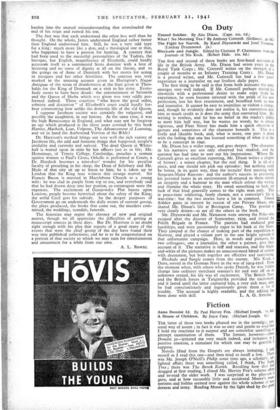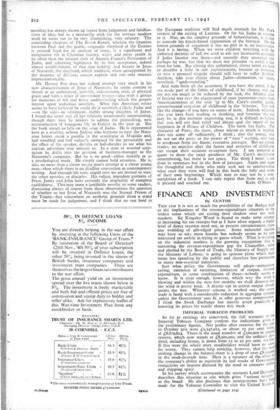Fiction
THE latter of these two books pleased me in the nostalgic, Per" sonal way of assent ; in fact it was so easy and gentle to read that I hold my reactions to it suspect and am somewhat unwilling to attempt examination of them. The former, however—Anno Domini 3z—irritated me very much indeed, and irritation is 3 positive emotion, a stimulant for which one may be grateful, I suppose. Novels lifted from the Gospels are always irritating, I told myself as I read this one—and then tried to recall a few. There was Mr. Joseph O'Neill's Philip some time ago, a scholarly, u°, lighted affair; there was something called, I think, The Pa' Tree ; there was The Brook Kerith. Recalling how that had dragged at first reading, I closed Mr. Hervey Fox's solemn ding and re-read the older work. I was surprised at the pleasure a gave, and at how excusably little and accidental Moore's nun' nerisms and foibles seemed now against the whole scheme of ten- derness and irony. Reading Moore by the light shed by the great
novelists has always shown up lapses from judgement and falsifica- tions of idea, but as a measuring stick for the average modern work he turns out to be very diminishing, very salutary. The concluding chapters of The Brook Kerith, wherein the situation between Paul and the gentle, enigmatic shepherd of the Essenes is pressed hard for its content of irony, is a significant and imaginative tilt at Christian history, wider and more gentle in its effect than the famous shaft of Anatole France's Procurator of Judea, and achieving legitimacy by its free acceptance, indeed almost establishment, of that rare nobility and beauty in Jesus of Nazareth, the shepherd, which tradition, when unsupported by the doctrine of divinity, cannot explain and can only recreate impressionistically.
Mr. Hervey Fox does not indeed attempt very much in his new characterisation of Jesus of Nazareth; he seems content to sketch in an unbalanced, irritable, sick-seeming man, of physical grace and with a voice of uncommon beauty—also with a genius for moments of wit and fierce understanding which the gospels impose upon audacious novelists. What this American writer seems to have believed he could do is establish a likely Judas and —on the side—an adolescent, highly strung daughter of Jairus. I found the latter and all her relatives wearisomely uninteresting, though there may be readers to admire the painstaking, neat reconstruction of bourgeois life in Galilee in the year 32. But the book stands or falls on the issue of Judas. He is represented here as a wealthy, urbane Judean who happens to hear the Naza- rene healer speak a parable in the synagogue at Magdala and, half troubled and half vulgarly intrigued by the personality and the effect of the speaker, decides or half-decides to see what his curious adventure may amount to. In a state of worried scep- ticism he drifts into the position of business-manager to the Nazarene's campaign. But he is no good—either morally or as a psychological study. He simply cannot hold attention. He is, alas, no more than a clever young man's attempt at a clever young man—than which there is no deadlier convention in contemporary writing. And through his vain, stupid eyes we are invited to view the other apostles, or disciples. His vulgar, impudent portraits of Peter, James and John have certainly the originality of complete caddishriess. This may seem a justifiable novelty to some readers, dismissing always of course from these observations the question of whether or not Jesus of Nazareth was the Second Person of the Trinity—but somewhere on aesthetic grounds alone a stand must be made for judgement, and I think that no one bred in
the European tradition will find much stomach for Mr. Fox's version of the raising of Lazarus. Or for his Judas in reaction to it. Nor, on the simplest grounds of behaviourism, is it easy to concede his knock-kneed explanation of the betrayal. On the lowest grounds of argument it has no plot in it, no horse-sense. And it is boring. When we were children wrestling with the awkward doctrine of hell we used to ask our instructors anxiously if Judas Iscariot was there—and uneasily they answered that perhaps he was, but that we must not presume to awful a fate even for him. But closing this unfortunate, clever novel we have to shudder a little in our sophistication, because so immense, so vast a personal tragedy should still have to suffer fly-blow. Anyhow, take your choice about Judas—damnation, or smart, novelistic " understanding."
And turn from all the acuteness, if you have the mind, if the sea made part of the fabric of childhood, if by chance, and you are not too tough to be seduced by the luck, the Atlantic coast of Ireland was ever the playground of your innocence—turn from Americanisations of the year '32 to Mr. Cary's careful, gentle, unsentimental evocation of childhood in the 'nineties. You will like the change—if you have an ounce of taste. Indeed, whatever else you have been reading or thinking, and however the war may be at this moment engrossing you, it is difficult to believe that you will not find relief and dream and the music of lost happiness in A House of Children. The book has faults. The character of Pinto, the tutor, about whom► so much is implied, does not come off sufficiently, I think ; also the young, who do not see the point or the power of " easy " writing, may turn in arrogance from the fluent, evocative passages. But no patient reader, no searcher after the fusses and anxieties of childhood, can escape their accurate re-capture here. I am tempted to quote to show the exact goodness of Mr. Cary's imaginative remembering, but there is not space. The thing I mean is not done in sentences but in the flow of passages. Again and again the thoughtful and those who truly seek not to sentimentalise what once they were will find in this book the folly and storm of their own beginnings. Which may or may not be a com- mendation of a book. I can only repeat that from end to end































 Previous page
Previous page